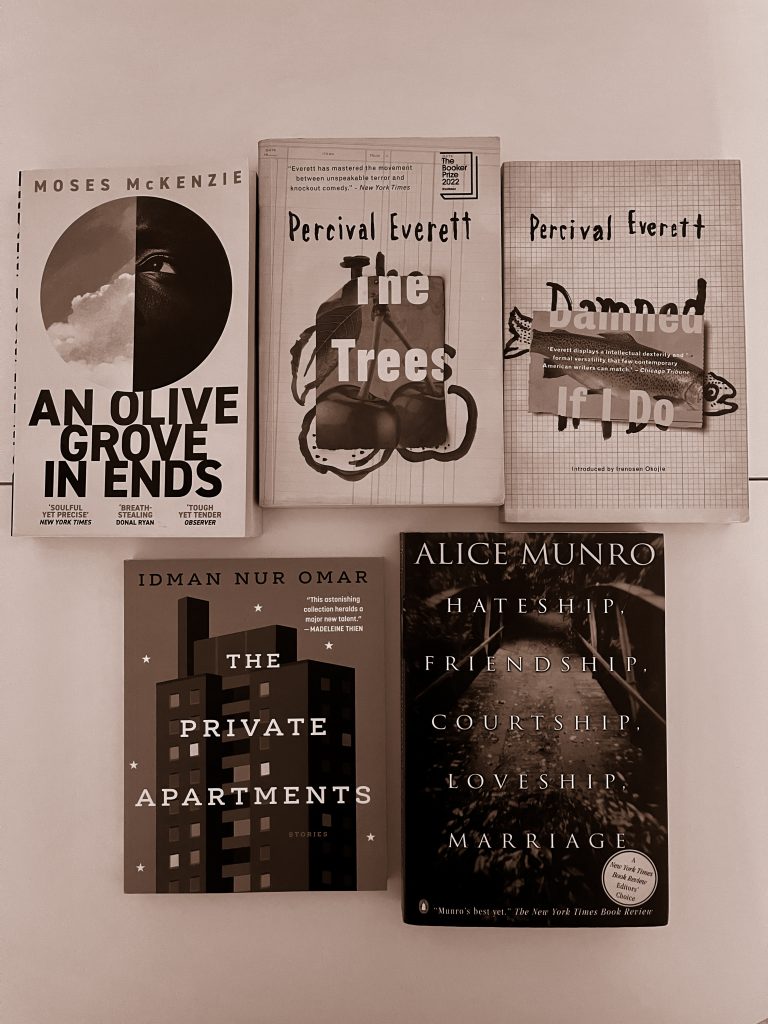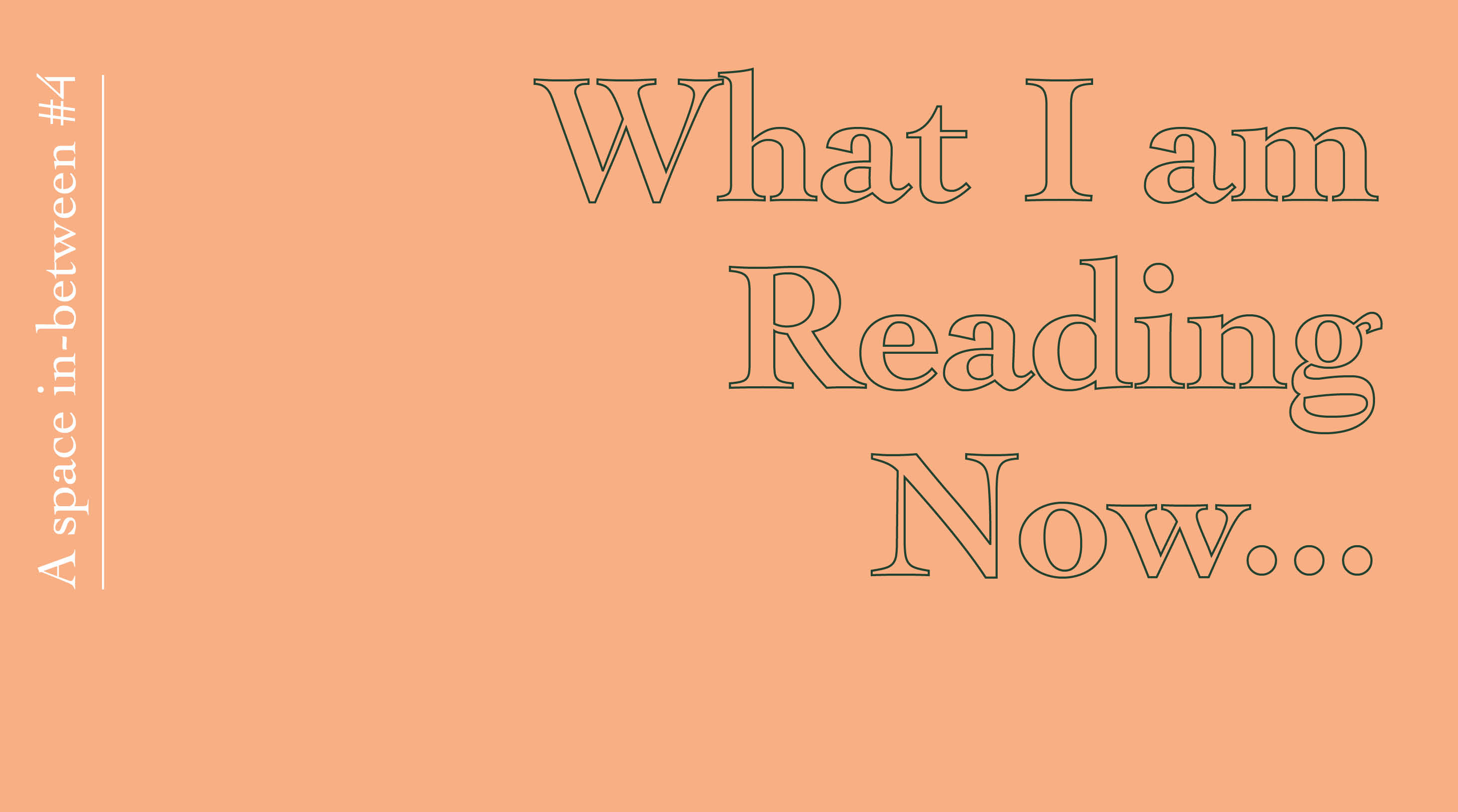What I am Reading Now…
Aurella Yussuf
September 2024
For pleasure, I almost exclusively read fiction. This has been my habit since childhood, and one that I always return to like a comfort blanket, especially since I am usually immersed in academic reading for my doctoral research.
I’ll begin with my most recent read, Moses McKenzie’s An Olive Grove in Ends. McKenzie feels like the British writer I have been eagerly awaiting for years. In a story that could easily turn cheap and sensationalist, he writes with a delicate touch about people and communities he knows intimately. Sayon’s urgency and desperation in his quest for salvation and escape from his circumstances, along with his disillusionment with religion, reminded me of people in my own life who I’ve never seen portrayed this way in literature.
The ending felt a bit too neatly tied up, but perhaps that’s just my age and cynicism showing. McKenzie shows such great promise, and I’m eager to see his future work. Sometimes I worry about the pressure placed on young artists to be the ‘saviours’ of an art form, and the inevitable disappointment or fall from grace if they don’t meet our unrealistic expectations. I hope he continues to carve out the space to develop in a way that is meaningful and true to himself.
The recent film American Fiction received critical and audience acclaim and is based on Percival Everett’s 2001 Erasure, a much darker, more complex, and challenging-to-adapt satirical novel. Despite its experimental style making it difficult to follow at times, it remains a rich and rewarding essential read. Everett’s more recent work, The Trees, kept me in a perpetual state of horror and humour. The heavy topic—a police investigation into a series of lynchings—is interspersed with wit and outright comedic moments that lift you from the weight of the plot.
I’m also a huge fan of short stories, it might actually be my favourite form of fiction. The stories in Everett’s 2004 collection Damned If I Do have a weariness to their characters, along with a tension between realism and surrealism. His writing frequently has a hallucinogenic effect; it’s hard to predict when it will veer into the absurd, yet it’s so convincing that you find yourself questioning reality. It leaves me feeling heady and disoriented, sometimes confused, but still wanting more. Some might consider Everett a writer who focuses on race and racism in America, but it’s simply one aspect of his multifaceted storytelling.
Somalis consider ourselves a nation of poets, but poetry isn’t really my thing. So, I was excited to discover Idman Nur Omar’s The Private Apartments at Anansi Press, an independent publisher and bookstore in Toronto. This collection spans decades and continents, offering glimpses into the lives of mostly women across the Somali diaspora. The stories have a voyeuristic feel, like peeking through the windows of the titular apartments—a brief flash of a moment in time, yet still somewhat distant. I was previously unfamiliar with Omar, but she is now on my list of emerging writers to watch.
Given my love of short form fiction, Alice Munro had long been a favourite of mine, often regarded as the contemporary master of the medium. Following her death in May of this year, I revisited Hateship, Friendship, Courtship, Loveship, Marriage, a treasured collection. However, not long after this, Munro’s daughter made public a devastating family secret—that she had been sexually abused by her step-father, Munro’s second husband, and that her mother chose his side over her own child, leading to a severed relationship between them.
With this revelation, Munro joins a long list of writers whose personal transgressions permeate their work. I don’t believe in separating the art from the artist; it’s a logical fallacy—the former cannot exist without the latter. Consequently, my experience and memories of reading Munro’s work are now permanently tainted. It is crucial to recognise that, in light of such denial and lack of care for a child failed by all the adults in her life, my experience as a reader is insignificant. However, in the absence of ‘cancellation’ of these figures who occupy significant space and prestige in private life, public consciousness, and the literary canon, we are left asking how to reconcile the work with the wrongdoing.
Aurella Yussuf is a writer and art historian, whose work focuses on the work of Black artists in Britain and beyond. She is a founding member of interdisciplinary art collective Thick/er Black Lines and the co-creator of the Blk Art Map. Aurella is currently pursuing a PhD at the University of Birmingham.
Reading
An Olive Grove in Ends, Moses McKenzie (Wildfire, 2022)
Erasure, Percival Everett (University Press of New England, 2001)
The Trees, Percival Everett (Influx Press, 2021)
Damned If I Do, Percival Everett (Influx Press, 2004)
The Private Apartments, Idman Nur Omar (Anansi Press, 2023)
Hateship, Friendship, Courtship, Loveship, Marriage, Alice Munro (Penguin Canada, 2002)

Please note the views published in What I am Reading Now… are personal reflections of the contributors.
These may not necessarily represent the views of the University of Dundee.
Readers who wish to make a donation to support Medical Aid for Palestinians can do so here.
———
